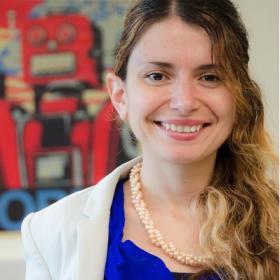
ABSTRACT - The Internet has become a plague on democracy. Worldwide, we have seen the surge of disinformation, hate speech, and hackers. Online violence and disinformation has had a chilling effect on citizen participation, undermining democracy in all its key elements. To counter these threats, numerous tools and platforms have emerged. However, these platforms have so far been ineffective at opposing disinformation. I argue that to design effective tools we need to first understand how people participate and engage with disinformation.
In this talk, I first present my large scale data analysis research on how popular sites that fabricate disinformation are able to engage people. Using framing theories from collective action research, I uncover that news reports that integrate conspiracy theories are the most effective at driving citizens to participate in disinformation. Armed with this knowledge, I present a new architecture for information systems to face and counter disinformation. I demonstrate how my proposed data-driven architecture nudges people to get out of their conspiratorial thinking. I show how we can use this architecture to address disinformation in a range of areas in our society, including political causes and the workplace. Most prior tools primarily focused on providing fact-checking mechanisms to counter disinformation. I instead, push towards information systems that nudge citizens away from their conspiracy thinking, and inspire them to address their cities’ problems to create improved societies. I finalize by presenting a research agenda that combines computation and social theories to design information systems that drive positive change and strengthen democracy.
BIO - Saiph Savage is a research scientist and software engineer at Microsoft Bing. Her research involves the areas of Crowdsourcing, Social Computing and Civic technology. For her research, Saiph has been recognized as one of the 35 Innovators under 35 by the MIT Technology Review and is a Google Anita Borg Fellow. Her work has been covered in the BBC, Deutsche Welle, and the New York Times. Saiph frequently publishes in top tier conferences and journals, such as ACM CHI, ICWSM, the Web Conference, and ACM CSCW, where she has also won honorable mention awards. Additionally, her research has been presented and adopted by presidencies in Latin America to drive better citizen-government collaborations. Saiph has received grants from the National Science Foundation, as well as funding from industry actors such as Google, Amazon, and Facebook Research. She has collaborated and given talks with civic organizations, such as, the National Democratic Institute, the Canadian Institute for Advanced Research (CIFAR), and the Aspen Institute. Saiph is currently also a visiting professor at the Human-Computer Interaction Institute at Carnegie Mellon Universitiy (CMU) and research professor at West Virginia University where she directs the Human Computer Interaction Lab. Saiph holds a bachelor's degree in Computer Engineering from the National Autonomous University of Mexico (UNAM), a masters and Ph.D. in Computer Science from the University of California, Santa Barbara (UCSB).
